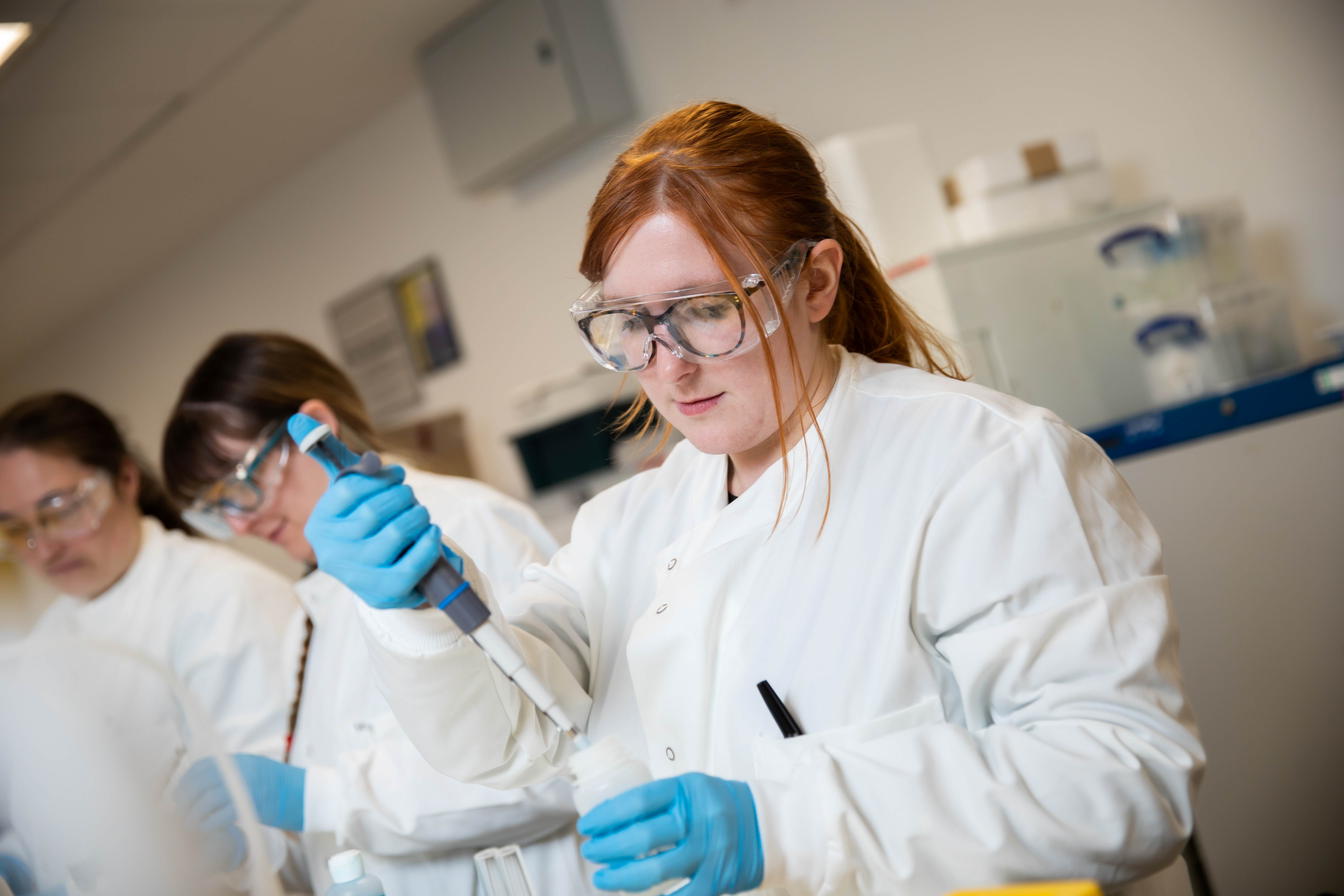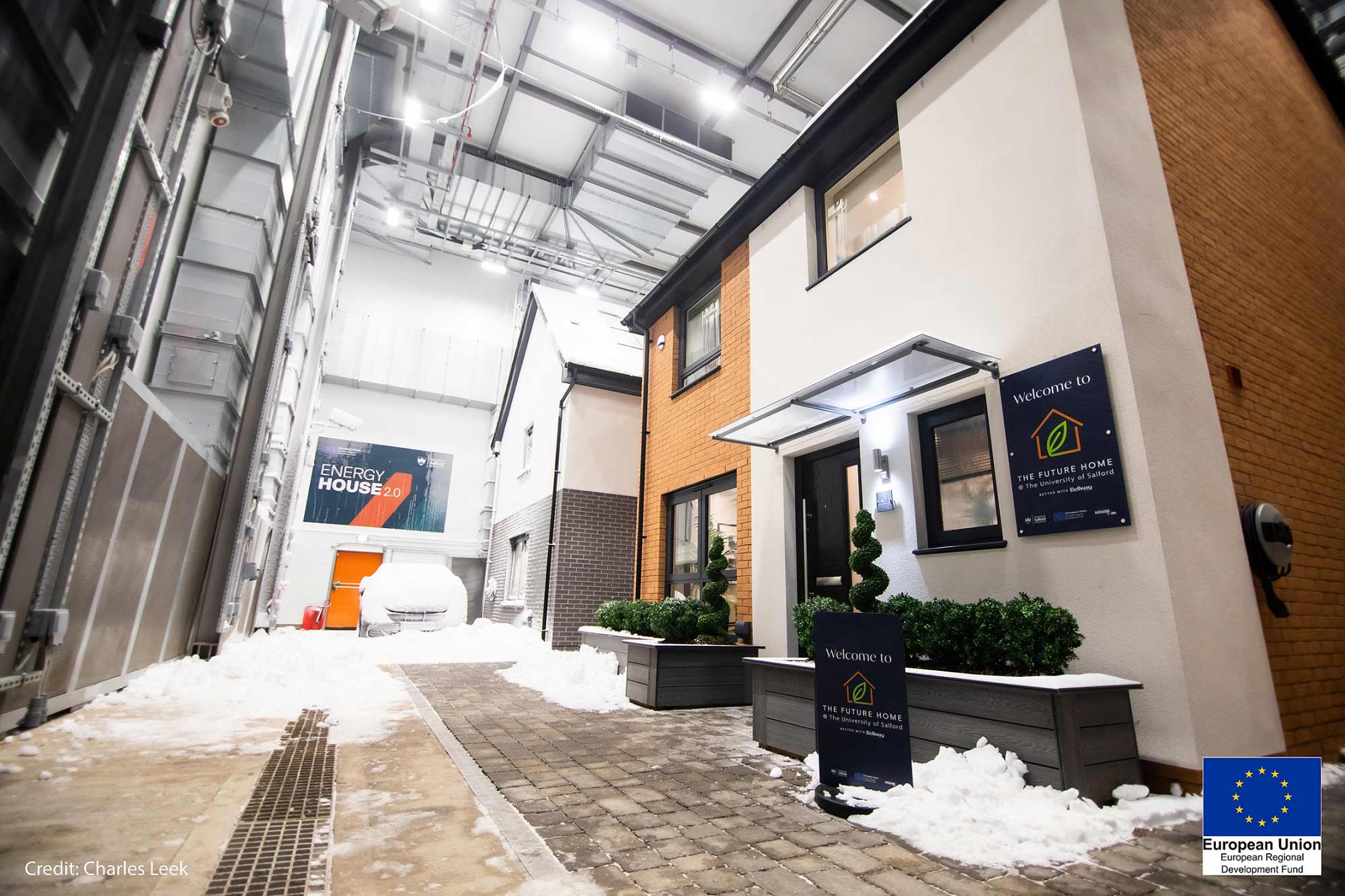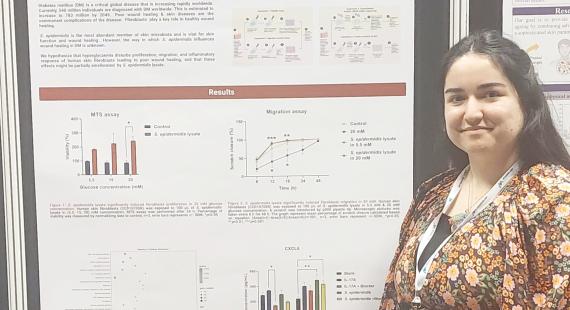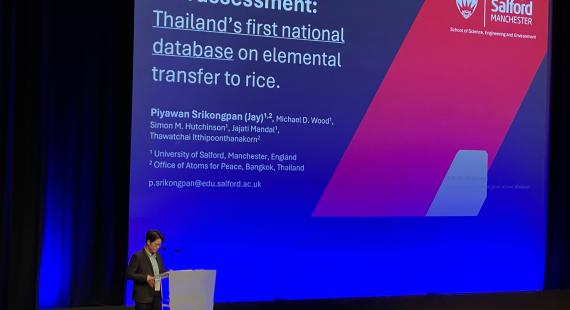Postgraduate Research in the School of Science, Engineering and Environment
SEE Postgraduate Research
The School of Science, Engineering and Environment is the largest school at the University of Salford. More than 300 postgraduate researchers (PGRs) research with us. We offer Full and Part-time PhD programmes as well as split-site and distance learning opportunities. Our innovative MPhil programme is designed to transition students from the guided module-structure towards independent learning and researching and our MSc students are supported acquiring the skills needed for a successful transition into a workplace of their choosing.
Why choose Salford?
Choosing to complete postgraduate research at the University of Salford opens the door to fantastic opportunity and comes with a myriad of support, including:
- A PGR proposal writing webinar and support sessions for applicants
- Generous annual conference travel grants
- International PGR Conference (IPGRC): Student-led conference with proceedings (every two years)
- An inclusive international environment
- Internationally recognised research centres and award-winning researchers and research facilities with strong links to industry
- SEE-specific training and development such as academics talk, a research webinar with invited speakers and subject-specific PGR Development Groups.
SEE International PGR Conference
The SEE International PGR Conference is taking place from 12th - 14th May 2026.
The topics span from the fields of Microbiology, Materials Science, Biology and Wildlife, Informatics, Built Environment and Climate and Construction.
We welcome applications to present your PGR or PGT research. For more information and to submit your proposal please visit International PGR Conference 2026 by 3rd December 2025.

Start your PGR journey at SEE: a step-by-step guide on how to apply
Step 1: PGR at SEE
In the School of Science, Engineering and Environment, you'll study in world-class research facilities and have access to industry-leading researchers to help and support you throughout your postgraduate research journey. Find out more in our SEE PGR brochure.
Step 2: Finding a potential supervisor
Review the profiles of our researchers who can be approached with a project proposal (not mandatory): View our staff or visit our Worktribe site.
Step 3: Guide to writing a research proposal, academic CV and personal statement
Find guidance on how to write your research proposal.
Join a Workshop: How to Write A Research Proposal
In this session, targeting our May 2026 intake, the Deputy PGR Director / Training and Development will guide prospective doctoral / PGR applicants through the key components of a strong research proposal required for the PGR application process. Participants will learn how to structure their proposal using our guided template, define clear research aims and objectives, align their ideas with supervisory expertise available in the School of Science, Engineering and Environment (SEE), and demonstrate originality and feasibility of the project proposed. The session will also cover common pitfalls to avoid and provide practical advice on how to make your proposal stand out during the admissions process. The sessions are organised 3 times per academic year, ahead of our intakes in January, May and September. If you complete this form you will be send the invitation link and the guidance document on how to construct your research proposal. This session will not cover any technical admissions related matter as this will be provided by the Deputy PGR Director / Admissions and Recruitment.
For more information on how to write an acceptable proposal, or to enquire about a webinar, please email SEEproposalwritingpgr@salford.ac.uk.
Step 4: Applying at Salford
Ready to apply? There are a number of things you will need to consider, such as study documentation, your research proposal, entry points and funding. Find out more about the process on our how to apply page.
If you have any questions or queries about your application, you can email pgr-supportssee@salford.ac.uk.
From receipt of proposal to receiving a conditional offer
Wondering how long the process is? Watch the below video to find out more:

Current PGR opportunities
The SEE PGR Training & Development Programme
SEE's PGR Training & Development Programme is a complementary set of sessions open for all SEE PGR students where we provide SEE-specific support alongside your journey.
Snapshots: PGR students' research in SEE
Read stories from our Science, Engineering and Environment students.
Research Centres at SEE
PGR students work together with our researchers in world-leading facilities such as the Energy House Labs, The ThinkLab, NERIC - our robotics centre - and laboratories for acoustics, civil engineering, biomedicine and environmental sciences to name a few. PGR students are an integral part of our research and academic teams. They have the opportunity to act as demonstrators in laboratories where they support undergraduate students, are encouraged to attend academic conferences with a generous conference fund and have the opportunity to chair a session at our International PGR conference (PGRC)
Acoustics Research Centre

The Acoustics Research Centre is a large acoustics group. Much of our research combines work in physical sciences and engineering, with sound perception by humans and other animals. We work to improve health, wellbeing and accessibility, for example by reducing the harms caused by noise. We also work closely with industry, government and third-sector organisations to make a better sounding future. Our postgraduate research is supported by extensive laboratories include anechoic chambers, reverberation chambers and listening rooms. The research centre runs two large doctoral training programmes. These are the Leverhulme Doctoral Training Hub in Aural Diversity (LAURA) and the ESPRC Centre for Doctoral Training in Sustainable Sound Futures. Both of these fund PhD places.
Biomedical Research and Innovation Centre

The Biomedical Research and Innovation Centre [BRIC] brings together a collaborative community of scientists who address critical challenges faced by society. Our research spans fundamental and applied aspects of bioscience research across a number of broad themes such as Microbial Communities, Cardio-Respiratory Physiology and Pathology, Cancer Diagnosis and Prevention, Ageing and Dementia, Infectious Diseases. We deliver world-class, interdisciplinary research which potentially benefits people’s lives; through tackling anti-microbial resistance, repurposing drugs for the treatment of malaria to identifying mechanisms, markers and molecules which can be used for prediction, diagnosis, therapy or prognosis. BRIC works closely with commercial, academic and healthcare partners across local, national, and international regions, including Europe, Asia, Africa. We are a named partner of the Industrial Biotechnology Innovation Catalyst (IBIC) which spans disciplinary and sector boundaries to accelerate knowledge exchange, development of skills and innovation.
Our research community works to support internationality and includes people from diverse backgrounds and identities to achieve their research goals.
Environmental Research and Innovation Centre

The Environmental Research & Innovation Centre (ERIC) has some 200 members and focuses on advancing the understanding of key environmental challenges of major economic and societal importance in the 21st century. The Centre has four main Research Groups: The Biodiversity Research Group, Pollution Research Group (PuRe), Green, Grow & Thrive Catalyst (GGTC) and Postgraduate Research Group. Alongside these groups are an array of supporting innovation units, such as Ignition, ThinkLab, Energy House and more. In addition to our Research Groups and innovation units, ERIC has access to an array of other unique resources. The Cockroft building – our laboratory building – provides the facilities to support postgraduate students to produce innovative research on topics such as: infectious and zoonotic diseases, fisheries management, green infrastructure, pollution and biodiversity and conservation.
We work across the globe with strong links with the Amazon in Brazil, across Europe, North America, a variety of sub-Saharan African countries and further afield. Projects address, for example, antibiotic resistance, using Virtual Reality to explore ecology in Chernobyl, understanding of primate evolution, greening and growing in cities, soil, air and noise pollution and much more. Researchers in ERIC work closely with colleagues in the Biomedical Research and Innovation Centre (BRIC) and other centres across the institution.
Informatics Research Centre

Research at the Informatics Research Centre evolves around data and information in all their types and usages. Researchers at this centre cover all phases and processes from data pre-processing to engineering and visualisation. In doing so, the centre is developing novel methods and systems for the analysis and recognition of various data sets, learning behaviours and causal models. The results are techniques and systems that have a range of potential applications, from digitisation of historical documents, medical diagnosis, and text mining to retrieval and data visualisation. Forensic computing, digital investigation, and Cyber security are additional areas of expertise of researchers at the Informatics Research Centre.
The Centre For Future Engineering

The Centre for Future Engineering is known for working across the fields of mechanical, aeronautical, aerospace, photonics, microsystems and civil engineering, robotics and automation and advanced materials. Researchers collaborate closely with industry partners and foster interdisciplinary approaches to address real-world engineering challenges. Research topics investigated by PGRs have included autonomous vehicle development, sustainable construction methods, innovative materials, and advancements in renewable energy technologies, digital innovation, and environmental engineering.
The centre is actively pursuing these research topics, and more are added through the Northern Engineering and Robotics Innovation Centre (NERIC). NERIC is a research facility that focuses on the rapidly growing robotics and automation sectors and translates pioneering research in engineering into cost-effective solutions for industry. Robots provide aid for work that is dangerous, repetitive, dirty, and difficult. Researchers at NERIC explore and drive the future of robotics together with industry partners who share the goal to explore how robots can drive productivity.
Energy House Labs

The Energy House Laboratories are one-of-a-kind, world-leading research facilities that are forging the way in making our buildings carbon neutral.
Through commercial and grant funded research, Energy House Laboratories helps businesses understand how effective their products and services are in lowering consumers’ carbon footprint and reducing energy bills.
Learn more about our advance materials and manufacturing facilities.
Built And Human Environments

The research centre Built and Human Environments encompasses a broad range of research facilities and researchers. Among them are teams at IGNITION Living Lab and THINKlab.
At the IGNITION Nature Based Solutions (NBS) Living Lab, research tackles the climate emergency using Green Infrastructure (GI) experimentation technologies. The Mayor of Greater Manchester, Andy Burnham, appraised the lab as “…epitomising the kind of vision and innovation that Greater Manchester does best. … right now we are at the forefront of a new industrial revolution in sustainable technologies here in the North West.” Living Lab is an exciting development at the University of Salford campus demonstrating cutting edge green infrastructure technologies that continue to provide data for further research on hydrology, biodiversity and heat transmission through the structures, as well as how people interact with those installed green infrastructures. More information on the IGNITION lab and its director Prof Hisham Elkadi.
THINKlab is a facility where research is produced that contributes to managing the effects of global warming, developing cities and economies sustainably, and determining how to best care for an ageing population. Because these areas are predominantly advantaged through innovative approaches through developments driven by governments, industry, and researchers, the THINKlab team collaborates with a range of academic and commercial partners. Individual project teams investigate questions on how Resilient Cities and Smart Cities are effectively developed with the help of the lab and its unique services and creative facilities.
The overarching goal of the THINKlab is to provide an atmosphere of collaboration and co-creation pursuant of the goal of advancing digital innovation to solve global challenges. Learn more about the THINKlab and its director Professor Terrence Fernando and the technical director Dulcidio Coelho.

Doctoral School at Salford
Doctoral School
Research is rewarding - and challenging. What you need to succeed is focus, determination - and a supportive team to motivate, guide and inspire you.
The Doctoral School at Salford delivers world-class training and support tailored to your individual needs. We look for development opportunities that enable you to fulfil your potential.
Support
We are committed to creating a supportive and collaborative environment where researchers from all backgrounds can fulfil their potential.
We align our training and development activities to the principles in the Concordat to Support the Career Development of Researchers. Our long-term commitment is recognised at the European level through the HR Excellence in Research award, renewed again in 2018.
Community
A typical Salford research candidate? There’s no such thing. What connects our research community is our passion to explore. To question the world around us. To discover together. If you’ve got these attributes, you’ll fit right in.
Follow our community on social Follow @SalfordPGRS.
Annual PGR Conference
Our Salford Postgraduate Annual Research Conference (SPARC), is a popular two-day event that brings together our postgraduate research students and research community to showcase their work and exchange ideas.
Find out more about the research event.
Open Day
A postgraduate research degree with Salford is a rewarding investment in your future.
Learn more about postgraduate research opportunities by visiting our next open day.
You can speak directly to research team leaders, ask questions and consider your options.
Research news
Read the latest research news from our School of Science, Engineering and Environment at the University of Salford Manchester.










